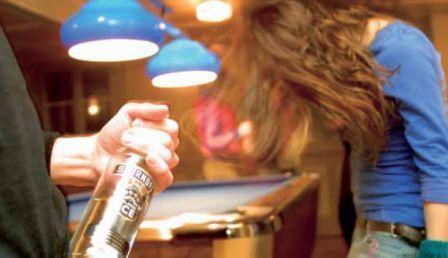Saanenland community confronts teen drinking
23.02.2007 BusinessIgniting discussions has been a rashof alcohol-fueled violence occurring outside the GreenGo discotheque at the Gstaad Palace. According to Andrea Scherz, general manager of hotel, there have been three fights so far this season. “We have had to stock up on security,” Scherz said. “This winter, we have been unlucky,” he continued. “One of the main reasons is the lack of snow, as there has been less reason to get up the next day to go skiing. Young people have more energy to stay up at night and get into trouble.” Scherz described the violence not as a new phenomenon, but as happening for “silly” reasons such as jealousy over a girl. He sees the fights increasingly affecting younger people.
He attributes this to the fact that young people seem to have no goal on the weekend and turn to drink out of boredom. “It is increasingly the tendency that young people have nothing better to do on weekends than to get completely drunk,” he said. Although he says he sees plenty of youth coming into the GreenGo who can handle a night out, there are others who don’t know how to take alcohol. “They drink in our parking lots in their cars. We find the bottles,” Scherz said. “When I was that age, sure we drank, but just enough to get tipsy. It was only once a year, maybe, that I remember not feeling comfortable or what you might call drunk. Parents are telling me that we’re giving their kids too much alcohol,” Scherz said. “The problem is that these parents give their kids too much pocket money.” And it’s not a bargain to drink at the GreenGo. Although Scherz abolished the GreenGo’s entrance fee -- due to competition from the likes of Chlösterli, Hush, and 911 Club -- the cheapest drink is SFr 30. He has also raised the entry age limit. “You now have to have been born in 1989 to get in,” he said. Scherz believes that education starts at home, and that it is far too easy for parents to blame others. He thinks parents need to check if their kids are drunk when they come home at night. They should set limits and dish out the consequences. “I was not allowed to go to the GreenGo until I was 18, even though my family owned the place,” Scherz said.
Increased parental vigilance and action was also the theme at a January 18 roundtable discussion in Saanen. Approximately 100 people -- ranging from event organizers, restaurant owners, government officials, police officers, and youth and education experts -- focused on creating alcohol policies for public and private functions where children and youth are usually present. These policies would be binding within all three communes. Here too it was concluded that parents need to do a better job of “observing and addressing”, instead of “looking away and tolerating”. Describing youth binge drinking as a societal problem, governor Michael Teuscher said: “The protection of children and young people is a social obligation.” He said that his office will conduct undercover alcohol purchases in shops. The legal age limits are 16 for beer and wine and18 for hard liquor. Those found to be breaking the law will be warned; in the worst cases they will lose their sales licenses. How can young people be stopped from bringing alcohol to events? What about when parents supply the alcohol? How do you deal with school children out late at night, many with parental permission? Some people suggested publishing the number of kids treated for alcohol poisoning each year. Parents need to set limits and enforce them. Both parent and child need to learn to say no. One goal expressed was to educate kids on the consequences of binge drinking, while helping them to strengthen their own initiative and feeling of responsibility. There were even suggestions to organize popular events without alcohol.




